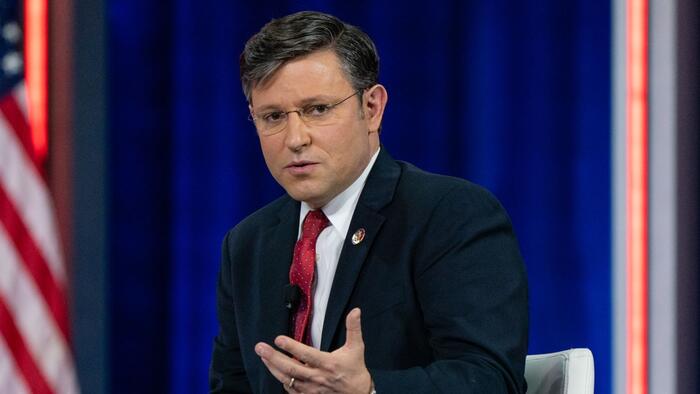The recent debate in the House of Representatives surrounding budget legislation has marked a significant and contentious moment in U.S. politics. As of the latest reports, a proposal to extend the federal spending deadline to 2027 has failed to secure the support needed to progress, garnering only 174 votes in favor against 235 opposed, with 38 Republicans defecting from party lines to vote against their leadership. This outcome is particularly striking, as it signifies a lack of confidence in House Speaker Mike Johnson, who had previously enjoyed unanimous support from his party just weeks before. The failure of this bill increases the likelihood of a government shutdown, with market predictions for such an event surging to 76%. Speaker Johnson now faces immense pressure to unify his caucus and negotiate a way forward amid growing frustrations and dissent.
Democrats in Congress have voiced strong opposition to the spending package introduced by Johnson, particularly criticizing its perceived inadequacy and lack of substantive negotiation. House Minority Leader Hakeem Jeffries labeled the proposal as “laughable,” indicating widespread discontent among Democratic lawmakers who were not part of the drafting process. This highlights a significant rift between the parties, as Democrats are demanding their own priorities—including disaster relief funding—while Republicans shift the burden of justification onto Democrats for any opposition to a spending resolution. The tension exacerbates the urgency for Congress to find a viable solution, as time runs short to avert a government shutdown.
A new spending deal has emerged from Republican lawmakers, aiming to provide temporary funding until January 30, 2027. This latest version of the spending package is considerably reduced in length, reflecting a leaner approach than its 1,547-page predecessor. With President-elect Trump’s backing and involvement in reshaping the legislation, which was previously hammered out with Democratic leaders, the House GOP sees this as a necessary step to maintain government operations. However, the specifics around disaster aids and approaches to the debt limit remain unclear. The potential implications of this package will weigh heavily on the discussions ahead, especially as rural Republicans are pushing for substantial inclusions related to agriculture.
Amidst these developments, Speaker Mike Johnson appears to be on uncertain footing, facing heightened scrutiny over his leadership and the direction of the Republican Party. Johnson has been criticized for his lack of visibility and transparency in negotiations and policy discussions surrounding the budget, leaving even members of his caucus feeling sidelined. There is a sense of urgency as a shutdown looms, with fears that optics and leadership failures could lead to long-lasting repercussions on the party’s cohesiveness and public perception. Trump’s influence looms large, with some members expressing concern over how his leadership and demands might complicate the negotiations required to pass crucial spending bills.
The dynamics of the negotiations underscore a broader conflict between moderate and hardline factions within the Republican Party. As hardliners continue to push against any deal that does not align with their conservative principles, moderates find themselves caught in a difficult position. With legislators having to balance the immediate needs of their constituents with the long-term implications of their choices on spending and the debt ceiling, the stakes have never been higher. Democrats are watching closely, preparing their strategy to counteract any moves that appear too far-removed from bipartisan cooperation, while maintaining their own priorities in funding.
As the countdown to a potential government shutdown continues, the pressure mounts on both parties to find common ground. The fallout from a failure to act could adversely impact government operations and public sentiment, potentially reshaping the political landscape ahead of upcoming elections. This tense environment serves as a critical reminder of the importance of collaboration and compromise within Congress, as lawmakers navigate the complexities of governance in an increasingly polarized political climate. Whether Speaker Johnson can navigate these turbulent waters remains uncertain, but the clock is ticking, and the consequences of inaction loom large.

